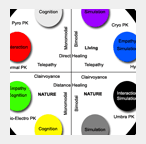Telepathy
Parapsychology Articles, Papers and Books
Home > Articles > Psychical Phenomena > Extrasensory Perception > Telepathy
![]()
|
| NEWSLETTERS |
| Get the best from QPsychics.com in your inbox! |
|
| PARAPSYCHOLOGY ORGANIZATIONS |
"With confidence in the importance of utilizing the investigative mode of the established sciences in order to inquire into the authenticity and to potentially explain the nature of psychical phenomena."  |
 |
 |
 |
 |
Telepathic Applications in Psychoanalysis
Telepathy is the psychical influence of thought via experient influence over the biological basis of consciousness and the mental process by which we perceive, act, learn and remember; Including mental forms and processes such as the nervous system in which processes and transmits information by electrochemical signaling. Psychoanalysis involves a body of ideas and is primarily devoted to the study of human psychological functioning and behavior. The three main components of psychoanalysis include:
In regards to the first component, telepathic cognitives and simulators will excel in investigative efforts due to their innate psychical ability to investigate the minds of other human beings. Through psychoanalysis, the telepathist can utilize their psychical ability to peer into (cognition), or personally experience (simulation), the thoughts, free associations, fantasies (either solely or via the verbal direction of the subject), and in some cases, the dreams of a patient whereby revealing the unconscious conflicts causing a patientís symptoms and character problems. Investigative psychoanalytic techniques include those correlated with telepathic cognition and simulation. While telepathic precognition can be utilized in conjunction with telepathic cognitive or simulation based investigative efforts, it is rarely utilized exclusively. In regards to the second component, theoretical orientations and interpretations in regards to human mentation and development vary, as there are several theories associated with psychoanalysis. Major psychoanalytic theories can be grouped into many theoretical schools (e.g. topographic theory, structural theory, etc.). † After the analyst has investigated the mind of the client or patient, the analyst then interprets the information for the client or patient to create insight for a resolution of the conflict. Such interpretations typically lead to the patient (with the assistance of the psychoanalyst) confronting and clarifying the patientís pathological defenses, wishes, and feelings of guilt. In regards to telepathic analysts, it is through telepathic skill and the analysis of conflicts that an analyst can clarify how a patientís mind is negatively affecting the patient and decide on a form of treatment. In regards to the third and final component, approaches in treatment vary based on the phenomenology of telepathy, theoretical orientation, and the problem requiring treatment. The most common problems treatable with psychoanalysis include phobias, conversions, compulsions, obsessions, anxiety attacks, depressions, sexual dysfunctions, a variety of relationship issues (e.g. dating and marital issues), a variety of character issues (e.g. shyness, meanness, obnoxiousness, workaholism, hyperdeductiveness, hyperemotionality, hyperfastidiousness, etc). Overall, telepathic cognitives and simulators will benefit the most from psychoanalytical applications.
(Adapted from the book ďTelepathy: A Quantum ApproachĒ by Theresa M. Kelly, MsD.)
|
|||

